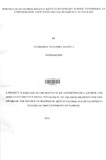| dc.description.abstract | The school textbooks are important mass media and are gender socialization agents which play crucial role in determining the students' worldview of gender roles in the society. Gender responsiveness is a vital issue iu the education system in general and in particular, in textbook publishing in Kenya.
Gender bias is unfortunately still present in many societies especially the developing countries. Such prejudice is in most cases in favor of males and against females. The females are still being looked upon as the weaker sex associated with stereotypical roles as stay-at-home mothers whose main task is to carry out household duties such as taking care of children, washing clothes, cleaning houses, washing utensils, collecting firewood among others. Such prejudice if present in a society can be manifested through educational materials such as textbooks.
The main purpose of the present study is to examine the extent and types of gender bias that determine gender roles in four of the New Integrated English textbooks series at the secondary school level. Sexism bas been investigated in five categories of visibility, authorship, firstness in dialogues, generic masculine constructions, sex-linked occupations and activities. The findings are expected to raise awareness regarding sexist practices in the New Integrated English textbooks learners, material developers and teachers.
This study examines the portrayal of gender roles in secondary school English textbooks using 'New Integrated Approach series' published by Jomo Kenyatta Foundation. The findings indicate under-representation of male gender in authorship. The findings reveal that male gender outnumber the female gender in usage of characters portrayed in photographs and firstness in dialogues. The study shows that the New Integrated English textbooks have tried to use gender inclusive, neutral and gender sensitive language in a few cases.
The study recommends training of education stakeholders on gender issues, developing elaborate assessment checklists for 'identifying gender stereotypes in textbooks and development of a more gender inclusive curriculum where men and women are equally represented in all areas. | en_US |

